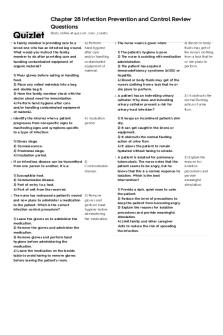HRM3420 Chapter 28 Reading PDF

| Title | HRM3420 Chapter 28 Reading |
|---|---|
| Author | Mayar Zeid |
| Course | Employment Law |
| Institution | York University |
| Pages | 1 |
| File Size | 52.2 KB |
| File Type | |
| Total Downloads | 30 |
| Total Views | 145 |
Summary
Download HRM3420 Chapter 28 Reading PDF
Description
HRM3420 Chapter 28 Reading The BFOR and Other Discrimination Defences The BFOR Defence This defence permits discrimination on a prohibited ground when that discrimination is based on an honest or good-faith belief that it is necessary for a legitimate business reason. o The BFOR defence Pre-Meiorin o The unified approach: the 1999 meiorin decision o Some applications of the BFOR defence BFOR: a defence to discrimination that an employer may use to prove that a discriminatory rule, standard, or practice was enacted for legitimate business reasons; it requires that the employer prove that it cannon accommodate needs without causing itself undue hardship. Indirect discrimination: a type of discrimination in which a rule, standard, or practice treats everyone the same on its face yet has an adverse impact on some people because of a personal characteristic Direct discrimination: a type of discrimination in which a rule, standard, or practice distinguished an individual or group based on a personal characteristic, such as separate pay scales for men and women or the practice of hiring people only one gender or one skin colour. The special interest organization defence This provision incorporates the BFOR test It requires that the employer demonstrate that a discriminatory practice is necessary and relevant to the performance of the job. Section 24(1)(a) of the HRC Other defences to prima Facie Discrimination A. Inability to perform essential duties owing to disability defence (Ontario) Section 17(2) also states that a worker cannot be found incapable if his or her disability could be accommodated without undue hardship on the employer B. The nepotism defence Section 24(1)(d), which states that it is not employment discrimination if an employer grants or withhold employment or advancement in employment to a person who is the spouse, child or parent of the employer or employee. Nepotism defence: a provision found in some human rights statutes that permits an employer to discriminate against workers on the basis of family status or marital status. C. The personal care attendant defence, homeworker defence, and domestic worker defence. Allows discrimination on prohibited grounds against an employee whose primary duty is attending to the medical or personal needs of the person. D. The bona fide pension or insurance plan defence E. The special program defence...
Similar Free PDFs

HRM3420 Chapter 28 Reading
- 1 Pages

Chapter 28 - Lecture notes 28
- 13 Pages

Chapter 28
- 13 Pages

Chapter 28 Immobility fundamental
- 35 Pages

Quizlet chapter 28 infection
- 2 Pages

Chapter 28 Unemployment
- 2 Pages

Summary - Chapter 28
- 3 Pages

Chapter 28 MC
- 30 Pages

Chapter 28 The Reproductive System
- 11 Pages

AP world chapter 28 outline
- 6 Pages

Artículo 28 - art.28
- 11 Pages
Popular Institutions
- Tinajero National High School - Annex
- Politeknik Caltex Riau
- Yokohama City University
- SGT University
- University of Al-Qadisiyah
- Divine Word College of Vigan
- Techniek College Rotterdam
- Universidade de Santiago
- Universiti Teknologi MARA Cawangan Johor Kampus Pasir Gudang
- Poltekkes Kemenkes Yogyakarta
- Baguio City National High School
- Colegio san marcos
- preparatoria uno
- Centro de Bachillerato Tecnológico Industrial y de Servicios No. 107
- Dalian Maritime University
- Quang Trung Secondary School
- Colegio Tecnológico en Informática
- Corporación Regional de Educación Superior
- Grupo CEDVA
- Dar Al Uloom University
- Centro de Estudios Preuniversitarios de la Universidad Nacional de Ingeniería
- 上智大学
- Aakash International School, Nuna Majara
- San Felipe Neri Catholic School
- Kang Chiao International School - New Taipei City
- Misamis Occidental National High School
- Institución Educativa Escuela Normal Juan Ladrilleros
- Kolehiyo ng Pantukan
- Batanes State College
- Instituto Continental
- Sekolah Menengah Kejuruan Kesehatan Kaltara (Tarakan)
- Colegio de La Inmaculada Concepcion - Cebu




